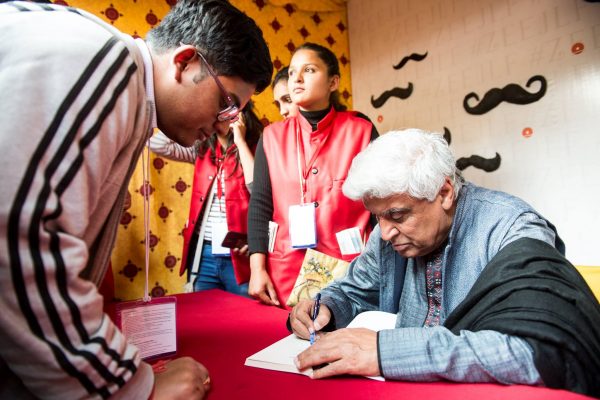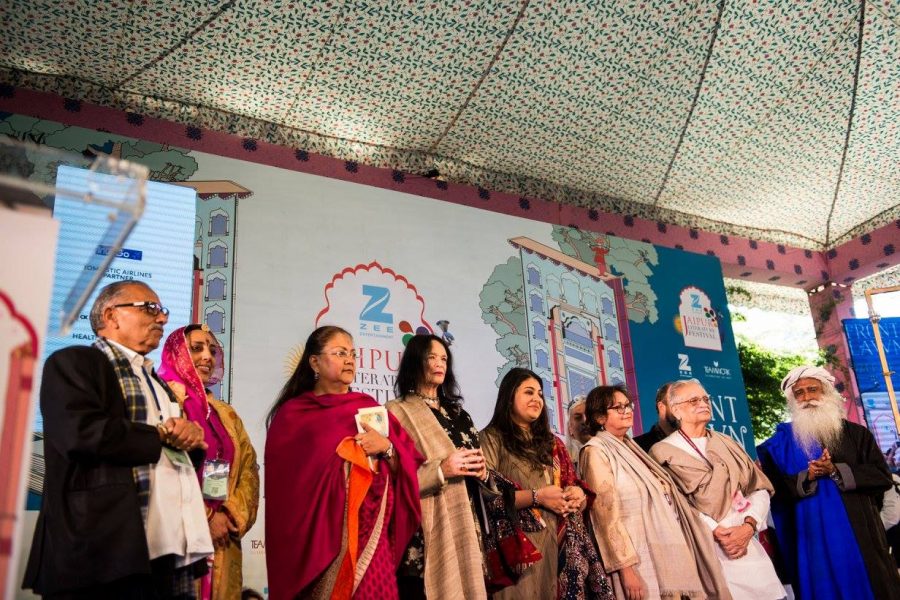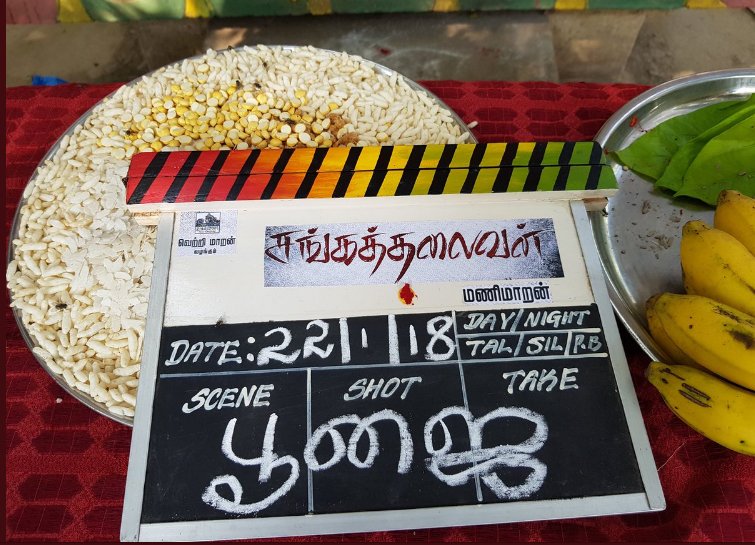The time was nigh for book lovers and literary enthusiasts to unite, under one roof (in this case, numerous shamianas and halls) and discuss their common interests and the works of their favourite authors. Taking place for the 10th time was the highly anticipated Zee Jaipur Literature Festival (JLF), frequently dubbed as one of the greatest literature festivals in the country.
Known for hosting interactive sessions and talks by acclaimed writers including Chimamanda Ngozi Adichie, Eleanor Catton, Hanif Kureishi, Ian McEwan, JM Coetzee, Mohammed Hanif, Oprah Winfrey, Orhan Pamuk, Pico Iyer, Salman Rushdie, Stephen Fry, Thomas Piketty, Vikram Seth, and Wole Soyinka, to name a few, this year’s festival added variety, housing music, and cinema artistes to the usual busy schedule. The five-day programme hosted around 250 authors, speakers, and artists, including Man Booker Prize winners Paul Beatty, Alan Hollinghurst, and Richard Flanagan, and Laurence Olivier award winner and two-time Academy Award nominee Sir David Hare.
From poetry readings to stories of dissent to taking political stands, from converting books to films to subtle mansplaining – the Jaipur Lit Fest 2017 had it all. The fest was inaugurated by poet and lyricist Gulzar, American poet Anne Waldman, spiritual leader Sadhguru and Rajasthan’s Chief Minister Vasundhara Raje on January 19.
Here are the highlights:
How demonetisation affected the JLF
According to a Business Insider report, JLF this year tried to go the Modi-way and embrace a cashless form of transaction. The idea was to have the registration badge, which came with a unique barcode, function as a wallet. The e-badge could be loaded with cash in Indian rupees or via Indian and/or international credit/debit cards. However, according to the report, several machines were not working and many transactions failed to take place, resulting in chaos over lost money.
Taslima Nasreen rooting for freedom of expression and democracy
Making an appearance on the final day, the Bangladeshi writer and activist Taslima Nasreen, who has been living in exile for the past 22 years, said that Islamic society needed to be more tolerant towards criticism to make progress. In conversation with Salil Tripathi, former contributing editor of Mint and Caravan and former board member of English PEN, she took on a rather controversial topic for the event – nationalism and religion.
“I don’t believe in nationalism, religious fundamentalism. I believe in one world. I believe in rights, freedom, humanism and rationalism. Until Islam accepts criticism, no Islamic country can be considered secular. Whenever I criticise, people want to kill me,” she was quoted saying.
She also discussed the fatwa issued against her for her work. Pointing out that “all religions are against women“, Nasreen asked, “When I talk about women rights, I criticise religions that do not have equal rights for women. Hindu women in Bangladesh do not get the freedom they have in India. What kind of democracy is it?”
Shashi Tharoor on India’s history
via CatchNews
MP Shashi Tharoor’s session drew flocks of people from across the country (and the world), resulting in a full house. A regular in several literary events, Tharoor was in conversation with Dr Don Wilson, author of India Conquered: Britain’s Raj and the Chaos of Empire.
The two discussed history, the economy during the British Raj and the rule that culminated in years of oppression. “What the British Raj has deprived us of is our self respect. That, ultimately, is the key issue of colonisation,” he said, drawing thunderous applause from the audience.
Javed Akhtar’s session had ‘mansplaining’ written all over it

The poet and Bollywood lyricist Javed Akhtar held a session called “After the Angry Young Man, the Traditional Woman” on the fourth day of JLF. The session focused on the subject of the depiction of women and men in Bollywood. According to Ila Ananya of online magazine The Ladies Finger, Akhtar responded to a question about the flak Pakistani actors have been getting in Bollywood with a tangential rant about how men from small towns may never realise that women are human beings too.
“In an average Indian city, by the time a boy becomes 20 or 21, he has not spoken to a girl who is not his sister for more than five minutes in his whole life. How would he know that she is a human being? How would he know that she has any other thing beside her body? Men who come from towns to the city have no place to live. They are treated like animals. They see affluence and people doing well around him, and he gets angry about why he is so deprived. Then his anger comes out where it can come out [against women],” he was quoted saying.
Ila Ananya argued instead that if only Akhtar had spoken to actual women about sexual assault, he wouldn’t have been make that distinction between city men and men from towns.
Aficionados on cinema today and its influence
On the final day of the festival, Imtiaz Ali, director of films like Tamasha (2016), Jab We Met (2007), and Rockstar (2011), was in conversation with Professor Rachel Dwyer of Indian Cultures and Cinemas at SOAS, filmmaker Sudhir Mishra of Hazaaron Khwaishein Aisi (2003), and film critic Shubhra Gupta. The panel talked about about how Indian cinema, unlike Hollywood, was about the people – not superheros, and how Indian cinema reflects India’s social, political and economic dynamics.
Recommended
“As filmmakers, we pick up our pulses from what we see around us, from what we experience. Every age, every decade has its own cultural fabric. And filmmakers pick that up and project it in their narratives,” Ali was quoted saying, adding that his film Jab We Met, however, was really about nothing. “I wasn’t trying to make a statement then,” he said.
***
Other sessions included Devdutt Patnaik on mythology and politics today, The Guardian journalist and author Luke Harding on the Edward Snowden files and the design of the surveillance system, and musical performances by The Raghu Dizit Project, Lisa Hannigan, Kabir Cafe, Bombay Bassment, and Rajasthan Josh.
*****
Feature & Other Images: Courtesy Zee Jaipur Literature Festival’s official Facebook page



